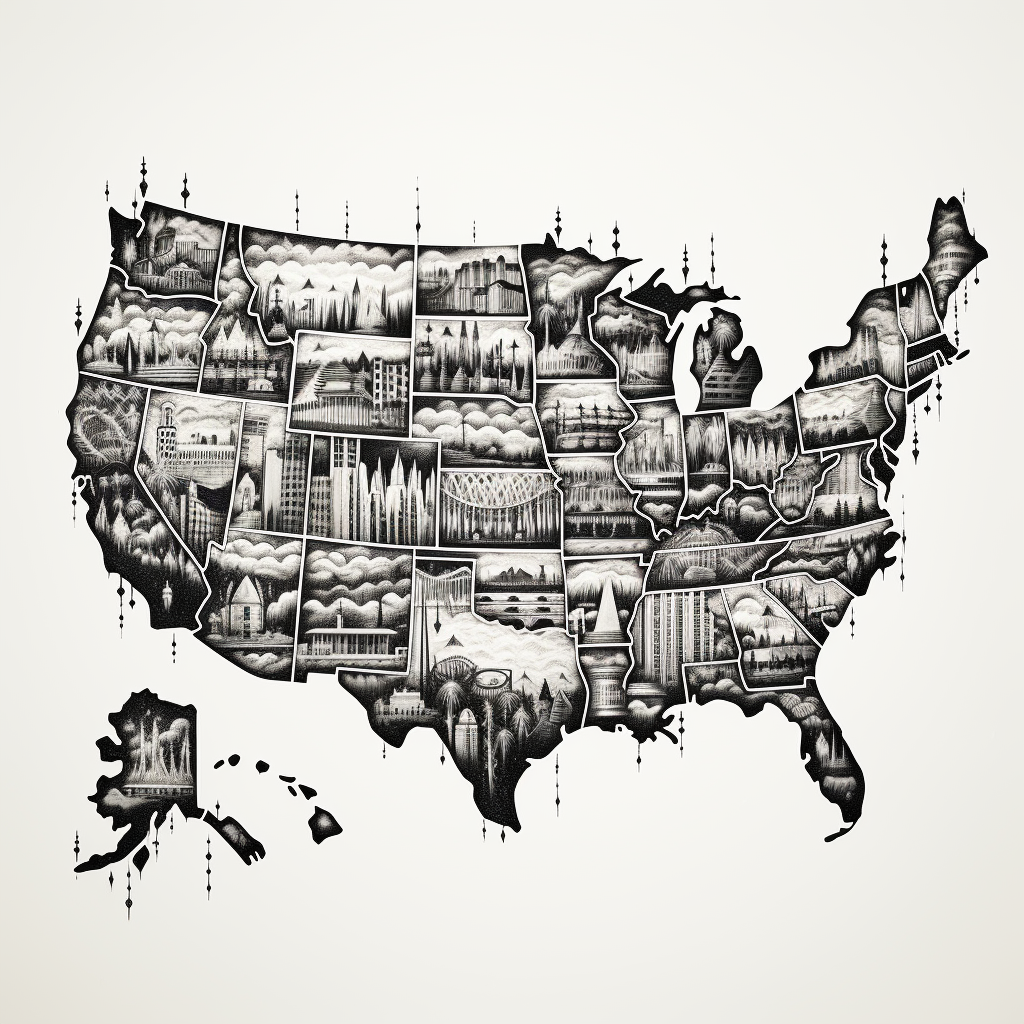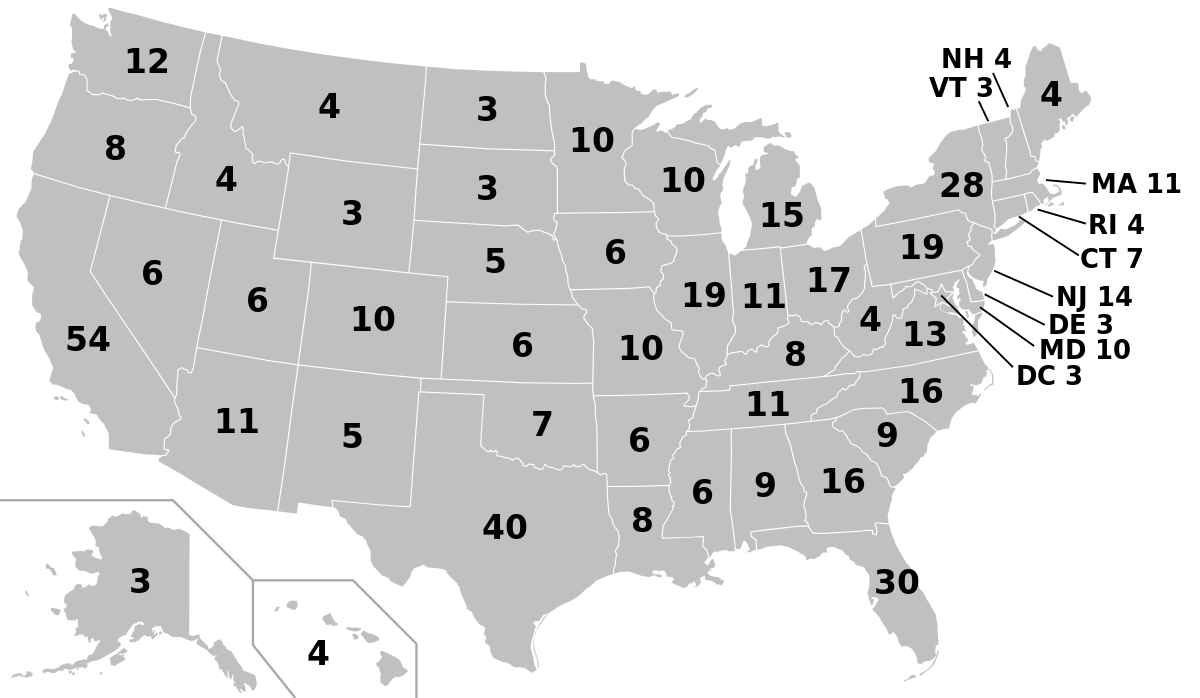Blog

It’s no secret that the Electoral College – the system America uses to actually elect each President – is pretty unpopular amongst the general public. Instead of electing our presidents based on the popular vote, the Electoral College creates a confusing bureaucracy in which each state is assigned a number of “electors” – roughly corresponding to that state’s representation in Congress.
So any time you see this map, each of those numbers correlates to how many electors each state is assigned in the Electoral College.

This system not only favors low-population states (Wyoming’s 3 electors corresponds to one Electoral College vote per 195,000 people, whereas California’s 54 electors corresponds to one Electoral College vote per 726,000 people), but it’s actually even more anti-democratic than it seems on the surface.
In short, the basic mechanism is that after votes are tabulated by each state, the actual electors themselves – yes, these are real, actual people – convene in December after the election to actually cast their votes for President. These are the votes that actually matter.
Typically, the electors will simply vote for the candidate who won the popular vote in their state. When they do so, they ensure that the candidate who won the most votes actually gets credit for it in the count to 270 electoral votes – that’s the threshold necessary to win the presidency. Since there’s 538 electors in total (equivalent to the number of representatives in Congress and the Senate, plus 3 for Washington D.C.), 270 is the minimum possible number needed to ensure a majority, and thus the presidency.
However, note that we say “typically”... because there’s actually no federal law mandating that electoral college voters actually vote with the way their state voted. It’s up to the integrity of each individual elector to do the right thing… but they don’t have to.
Does this seem like a sustainable way to select the most powerful person on Earth?
Now, each state has their own unique penalties for electors that vote against the way their state as a whole voted. New Mexico law, for example, states that it’s a fourth-degree felony for an Electoral College member to cast their vote for someone other than the popular vote winner. In North Carolina, however, the penalty is a simple $500 fine.
All of this begs the question… who are these people? How did these 538 people, whose identities are largely completely unknown to the American public, find themselves in such a uniquely concentrated position of power? What are their motives? What if they wanted to band together and just elect a completely different person?
Let’s get into it.
How The Electoral College Is Chosen
Our readers probably won’t like this answer, and for good reason – Electoral College members are hand-selected by whichever political party currently controls each state’s legislature. In blue states like Oregon, that means the Oregon State Democratic Party chooses the 8 people who will actually cast their real votes for President. In red states like South Carolina, it’s the South Carolina State Republican Party.
On the surface, this might seem normal, but let’s break down why this is a gross violation of the principles of democracy.
Not only is the Electoral College system itself an unnecessary side-step of direct democracy, but the electors themselves aren’t even chosen by some non-partisan entity. They are literally hand-picked by political parties. There is no vote. The public has absolutely no say on who gets chosen to represent their state in the Electoral College – in fact, the public basically has no idea who these people are. Their identities are mostly a mystery to the public at large.
And not only are their identities largely a mystery, they pledge loyalty to their political party. Not the state, not the nation, and not the voters. They are chosen specifically for their party loyalty, and nothing else. They are chosen, not elected, by each state’s ruling party, and they are chosen in secret with no shred of public input.
Ballotpedia has a great resource to discover who the actual people that cast your states' votes for president are – but how many people are even aware of this? Why should we be depending on a single website just to even discover the identities of the people responsible for actually electing the next President of the United States?
We encourage you to follow this link and look up who your state’s electors are. Do you even recognize a single name on your list?
Most of us probably assume that voters in America choose their politicians, who sort themselves into political parties. In reality, it’s almost the exact opposite: the political parties are the ones who select, in secret, the people who actually determine who the next President will be. Your individual vote might as well be a novelty, an afterthought.
Now, for the most part, Electoral College members vote for their state’s popular vote winner – as they should. But not all of them do. These are known as “faithless electors” – Electoral College members who completely disregard democracy and instead vote for whoever they personally feel like. Even if that may result in fines or imprisonment, it’s technically possible for the Electoral College to completely bypass the results of the vote and elect whoever they want.
It’s rare, but it happens. In the 2016 election, seven individual Electoral College members ignored the way their states voted and cast their votes for completely unrelated candidates. Seven!
In Washington State, four of the state’s 12 electors did not cast their vote for Hillary Clinton, who easily won Washington’s popular vote. Three voted for former Secretary of State Colin Powell, who did not even run for President, and one voted for Faith Spotted Eagle, a Native American activist.
In Texas, two of the state’s electors ignored Trump winning the Texas popular vote and instead cast their ballots for John Kasich, who dropped out of the Republican primary after only winning a single state, and Ron Paul, who ran for president in 2012.
Does this seem like a healthy democracy? What if the election was so close that a single faithless elector could swing the result in the other direction?
These may be hypothetical questions for now, but that’s only because we’ve gotten lucky so far. These are not just theoretical potentialities, but very real possibilities.
And it’s all to give political parties more of an iron-grip over the control of their states and over the nation as a whole.
We can do so much better.